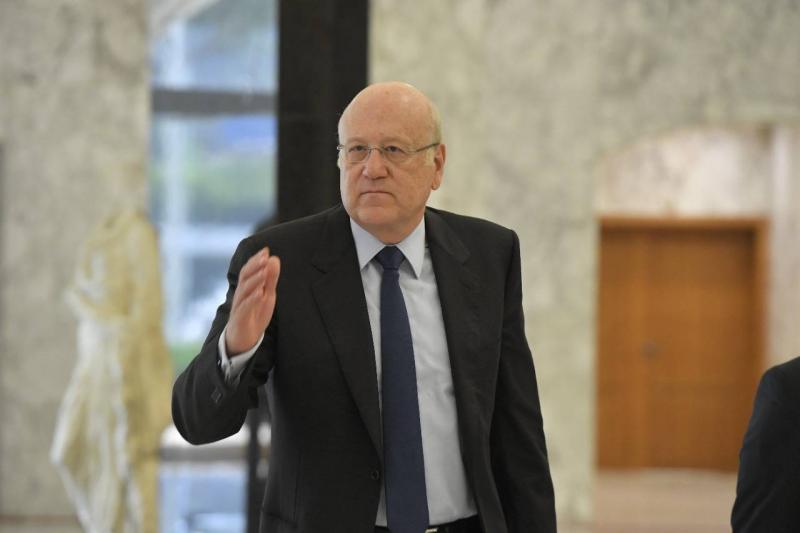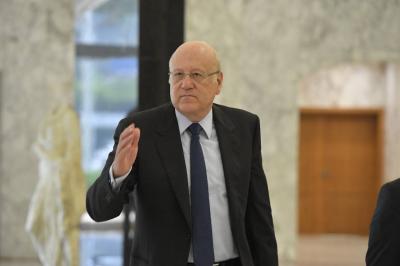Lebanese Prime Minister Najib Mikati has launched a peace plan in an attempt to prevent the ongoing war in Gaza from spilling into Lebanon. Mikati has been touring regional capitals and speaking to Western diplomats and politicians in an effort to persuade them to find ways to avoid escalating violence. Mikati specifically aims to prevent Hezbollah from joining the fight against Israel, which could ignite a regional conflagration. He stated from his office in Beirut: "I am exerting all possible pressures locally, regionally, and internationally to prevent war."
In an interview with the British magazine "The Economist," Mikati outlined his three-point structural plan. First, a five-day humanitarian ceasefire, during which Hamas would release some of its hostages, particularly civilians and foreigners, while Israel would halt its fire and allow humanitarian aid to enter Gaza. Furthermore, Hamas must cease its rocket attacks. If the first point succeeds, we can then move to the second point, which wouldn’t be temporary: with the help of mediators, Israel and Hamas could negotiate a prisoner exchange for the hostages. At that point, Western and regional leaders could implement the third point, which involves holding an international peace conference to reach a settlement based on a two-state solution. Mikati remarked: "We will take into account the rights of Israel and the rights of the Palestinians. It is time to make peace possible in the entire region."
The magazine highlighted that "with the intensifying war across the Middle East, many Arabs may retract Mikati's implicit recognition of the Jewish state, but this is not the first time an Arab leader has proposed a peace plan during war." It referenced that during the peak of the second Palestinian intifada, Saudi Crown Prince Abdullah bin Abdulaziz, who later became king, launched the Arab Peace Initiative, which called for full normalization of Arab relations with Israel in exchange for a complete withdrawal from the territories occupied since the 1967 war. Indeed, Arab leaders endorsed this plan at the 2002 Beirut Summit.
According to the magazine, "Mikati’s plan goes a step further by inviting Iran, the main coordinator of what he calls the 'Axis of Resistance' against Israel, to participate in the conference." Mikati emphasized that "the Iranians will be part of a comprehensive peace." He was among the first to meet with Iranian Foreign Minister Hossein Amir Abdollahian in the early days of the current war in Gaza, and Hezbollah is part of the government he heads. He added: "If we reach an agreement on comprehensive international peace, I am confident that Hezbollah and Hamas will cease their involvement in the conflict."
The magazine quoted someone close to Mikati as saying that his relationships with the West, the Gulf, and Iran place him in a good position to implement a comprehensive plan, adding that Mikati discussed the matter with the foreign ministers of the United States, Britain, and France, and his plan was not rejected by these countries. On October 29, Mikati visited Qatar to discuss his plan with the Gulf nation's leader, Tamim bin Hamad Al Thani, who has been leading extensive diplomatic efforts, especially since Qatar has also hosted David Barnea, the head of Israel's intelligence agency (Mossad).
The magazine noted that "one of the obstacles facing Mikati is his lack of influence; he heads a shattered and bankrupt state, Lebanon is without a president, and the strength of its army does not compare to that of Hezbollah fighters. Additionally, the rising death toll among Palestinians in Gaza also diminishes prospects for immediate peace. In fact, Hamas has appealed to Hezbollah to open a second front, and gunfire has been exchanged at the southern border for several weeks between Hezbollah and Israel, resulting in the deaths of about 50 Hezbollah fighters and seven Israeli soldiers. The party primarily targeted military objectives with its rockets, refraining from firing at northern Israeli cities like Haifa or Safed. Meanwhile, many Lebanese fear that Hezbollah Secretary-General Hassan Nasrallah might expand the scope of the conflict in his anticipated speech on Friday."
According to the magazine, "some of Mikati's Sunni Muslim supporters are calling for military action to support Hamas. In recent days, the military wing of the Islamic Group has urged its followers to mobilize alongside Hezbollah at the border with Israel. According to a recent Lebanese survey, one-third of Sunnis in Lebanon and half of Shia (but only 13% of Christians) support entering a war with Israel. Nevertheless, most Lebanese still fear being dragged back into another one of the Arab-Israeli wars that crippled Lebanon. Much of southern Lebanon and the southern suburbs of Beirut were devastated during Hezbollah's last war with Israel in 2006."
The magazine concluded, "Resolving the Israeli-Palestinian conflict would bring comfort not only to the two main antagonists, as Mikati says, but also to the neighboring countries. As he put it: 'No more wars forever.'"




